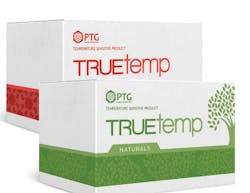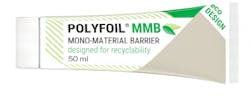Compared to many other industries, pharma manufacturing may not be as strongly associated with its negative environmental impacts. Yet, producing pharmaceuticals still leaves a large and lasting footprint.
“The pharmaceutical industry contributes significantly to the world’s climate crisis; 71 percent of those emissions are linked with the supply chain, including the production, transport and disposal of pharmaceuticals, other chemicals, and medical devices,” says Kelly Cinelli, director of marketing at Packaging Technology Group (PTG). “Pressure has mounted for both small and large pharmaceutical companies to have a sustainability plan.”
No longer just a bonus for some companies, sustainability efforts are becoming a must-have for pharma manufacturers. Here are some of the ways pharma companies can boost greener manufacturing initiatives throughout operations.
Sustainable shippers
As pharma therapies become more complex, so do the packaging and shipping requirements for transporting them. But that doesn’t mean that sustainability efforts have to be sacrificed in the shipping process.
Earlier this year, PTG launched a dual temperature pharmaceutical shipper as an addition to its TRUEtemp Naturals Cellulose line, made with 100 percent recyclable materials.
“PTG created its Naturals line of TRUEtemp products two years ago after seeing a need in the market,” Cinelli says. “Our clients asked for ‘greener options,’ and we created the first fully curbside recyclable, repulpable option for the pharmaceutical industry.”
The TRUEtemp Naturals Cellulose line is made of 100 percent curbside recyclable and repulpable products.
The new thermal shipper, which comes in a variety of sizes, allows medications and therapies with different temperature requirements to travel together in the same container.
“The dual temp shipper is especially useful for complex immunotherapies shown to be effective in combating certain cancers and other diseases,” the company says.
Cleaner water
One of the most common sources of pollution from pharma plants is wastewater — which makes it a prime target for improving sustainability.
“Now more than ever, pharmaceutical companies across the global manufacturing value chain are adopting a ‘do no harm’ approach when it comes to APIs and other harmful organic pollutants in wastewater discharged from manufacturing plants,” says Jonathan Rhone, president and CEO of Axine Water Technologies. “This means pharma companies are seeking new, cost-effective solutions capable of treating a wide range of APIs in wastewater to achieve Predicted No Effect Concentrations (PNEC) standards, while also enabling treated wastewater to be reused.”
To help the industry meet PNEC standards, which ensures that the wastewater has no adverse effects on the environment, Axine has developed a system that the company can build inside facilities to treat “virtually any complex or challenging organic pollutant in pharmaceutical wastewater.” The company says its system is based on “proprietary electrochemical oxidation technology, which uses advanced catalysts and electricity to oxidize and destroy a wide range of organic pollutants so the treated water can be safely discharged or reused.”
The system can also help companies hit other goals such as increasing water recycling and reuse, and eliminating off-site trucking and incineration of contaminated wastewater.
“With global manufacturing’s demand for water to soon outpace reliable supply, and pharma companies continuing to feel increasing regulatory and other pressures, sustainable innovations and practices have never been as important as they are today,” Rhone says.
Recyclable tubing
It’s no secret that plastic waste poses one of the greatest challenges to environmental sustainability. But by using recyclable materials, Hoffmann Neopac has innovated a line of tubing that the company says is “unsurpassed in its eco-friendliness.”
The company recently launched a novel line of mono-material barrier tubes that are designed for consumer products and topical pharma treatments and are fully compatible with existing recycling processes. The barrier tubes also help achieve another common goal for drug products.
Hoffmann Neopac's Polyfoil MMB tubes are the first to incorporate HDPE caps.
“Producing mono-material-based tube solutions with advanced thin film barrier options that maintain high performance barrier provide premium product protection and extend shelf life, which has been a goal we’ve been moving toward for years,” says Dr. Philippe Kern, director of R&D and Quality Management at Hoffmann Neopac.
Neopac’s Polyfoil MMB tubes are also 50 percent lighter than conventional Polyfoil tubes and are the first tubes to incorporate caps made with high-density polyethylene (HDPE) — a recyclable type of plastic.
Bio-based lubricants
Using environmentally friendly options for everyday operational products can also go a long way in improving sustainability.
“The pharmaceutical industry, like other responsible industries, is practicing energy efficiency, carbon footprint reduction and supply chain sustainability in their manufacturing processes,” explains Ming Shen, senior lab scientist at Cortec Corporation. “Likewise, Cortec tries to develop products with sustainability considerations at both initial materials selection and end of life-cycle stages.”
According to Shen, Cortec has developed a wide range of lubricating products for production lines used in several manufacturing industries — from food to pharma — that offer “green” options. In particular, the company says that its Ecoline Biobased Food Machinery Lubricating Grease #1 and #2 are particularly suitable for pharma.
“Made from natural seed oils, EcoLine Bio-Based Food Machinery Grease #1 and #2 provide superior lubricity to moving metal parts,” the company says. “They show good adhesion to resist water washout and have a wide range of operating temperatures.”
The lubricating oils are 96 percent bio-based and can be disposed of without harming the environment.
Top image: Axine's on-site treatment solutions establish a new standard for treating wastewater pollutants.


